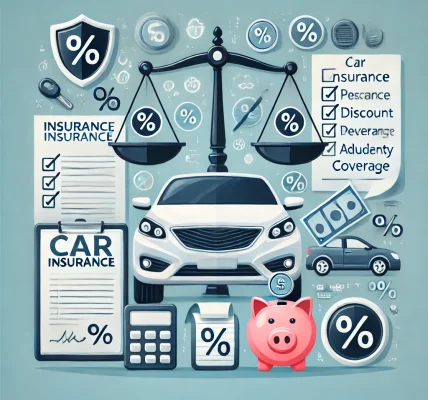ntrIoduction
With the rise of rideshare services like Uber and Lyft, more people are using their personal vehicles to earn extra income. However, many drivers overlook a crucial aspect: car insurance coverage. Standard personal auto insurance may not fully cover accidents that occur while driving for a rideshare company. In this blog, we will explore the importance of rideshare car insurance, the coverage options available, and how to choose the best policy to protect yourself and your passengers.
Why Rideshare Drivers Need Special Car Insurance
Rideshare drivers face unique risks that standard personal auto insurance does not cover. Since rideshare services are considered a business activity, regular car insurance policies often exclude coverage for commercial use. If an accident happens while you’re working, your insurer may deny your claim, leaving you with out-of-pocket expenses for damages and liability.
Rideshare companies like Uber and Lyft do provide some insurance coverage, but it has limitations. This is why many drivers choose to purchase rideshare-specific insurance policies to bridge the coverage gaps and ensure full protection.
Understanding Rideshare Insurance Phases
Insurance coverage for rideshare drivers is divided into three phases:
- Period 1: App On, Waiting for a Ride Request
- Personal auto insurance typically does not cover this phase.
- Uber and Lyft provide limited liability coverage ($50,000 per person, $100,000 per accident, and $25,000 for property damage).
- Collision and comprehensive coverage are not included.
- Period 2: Ride Accepted, En Route to Pick Up Passenger
- The rideshare company’s insurance provides higher liability coverage ($1 million in liability coverage).
- Collision and comprehensive coverage apply only if the driver has these coverages on their personal policy.
- Period 3: Passenger in the Car
- Full rideshare company coverage applies.
- Includes $1 million in liability coverage.
- Collision and comprehensive coverage apply only if the driver has personal collision/comprehensive coverage.
Types of Rideshare Car Insurance Policies
1. Rideshare Endorsement for Personal Auto Insurance
- Some insurance companies offer a rideshare endorsement that adds coverage to your existing auto insurance.
- Benefits: Affordable and extends your personal insurance to cover rideshare activities.
- Drawbacks: May not cover all rideshare phases.
2. Commercial Auto Insurance
- Designed for full-time rideshare or delivery drivers.
- Benefits: Provides comprehensive protection for business use.
- Drawbacks: More expensive than personal auto insurance.
3. Standalone Rideshare Insurance Policies
- Some insurers offer policies specifically for rideshare drivers, covering gaps left by Uber and Lyft.
- Benefits: More comprehensive than endorsements.
- Drawbacks: Higher cost compared to a standard policy with an endorsement.
Choosing the Best Car Insurance for Rideshare Driving
When selecting rideshare insurance, consider the following factors:
- Coverage Gaps: Ensure that your policy covers all phases of rideshare driving, especially Period 1.
- Cost: Compare premium costs for rideshare endorsements, standalone policies, and commercial auto insurance.
- Deductibles: Uber and Lyft have high deductibles ($1,000–$2,500). Look for policies that help cover these costs.
- Policy Exclusions: Read the fine print to avoid surprises in the event of a claim.
- State Requirements: Rideshare insurance availability and regulations vary by state. Check with your insurer for local requirements.
How to Lower Your Rideshare Insurance Premiums
- Maintain a Clean Driving Record – Fewer violations mean lower rates.
- Choose a Higher Deductible – Higher deductibles lower premium costs.
- Bundle Policies – Some insurers offer discounts when bundling auto and home insurance.
- Compare Quotes – Get quotes from multiple insurers to find the best price.
- Drive Safely – Some insurers offer discounts for safe driving habits.
What Happens If You Drive Without Rideshare Insurance?
Driving for a rideshare company without proper insurance can have serious consequences:
- Claim Denial: Your personal insurer may deny coverage if you’re in an accident while driving for Uber or Lyft.
- Policy Cancellation: Some insurers may cancel your policy if they discover you drive for a rideshare service without proper coverage.
- Out-of-Pocket Costs: You may have to pay for damages, medical bills, and legal fees yourself.
Conclusion
As a rideshare driver, having the right insurance policy is essential to protect yourself, your passengers, and your vehicle. While Uber and Lyft offer some coverage, it may not be enough to fully protect you in case of an accident. Investing in rideshare-specific insurance ensures peace of mind and financial security.
Before hitting the road, take the time to compare policies, understand coverage options, and choose a plan that best fits your needs. Safe driving! 🚗💼


